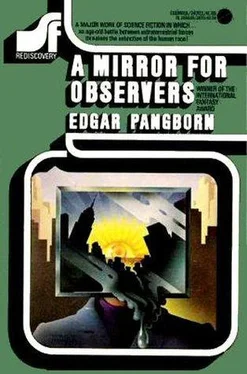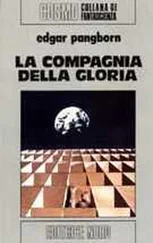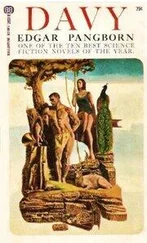Drozma, if you’re as clever as I know you are, you may deduce from the tone of these reflections that I have already seen Abraham again. That is true. He is in the next room, a room of his own if he cares to use it so. I don’t think Max’s people have followed him here, but I don’t intend to sleep anyway, and I dare say I could handle any of them. There may be a worse thing abroad in the city, or perhaps beyond the city by now, a thing before which the human or Martian mind winces and draws back, refusing belief. Abraham thinks it’s there. I am still able to doubt, to cherish a hope that he could be wrong. Being helpless in any case to act against it tonight, I stay awake in partial contemplation, and have written these subjective matters for you, Drozma, with a sense that there may be no opportunity for such things in the days and nights coming toward us. Abraham is sleeping off a pill I prescribed. It should hold him in peace until morning. He snores occasionally, rather like a puppy who’s run himself ragged during the day. Now about Sharon:
It’s still tough to find your way around Brooklyn: good thing for humanity, to hang onto a few problems it just never can solve. Nowadays you can go over in a new tunnel equipped with an electronic road — Robbie-roads they call ’em — which is actually a continuation of Second Avenue Lower Level. Sharon had claimed that if I took the Greene Avenue turnoff I couldn’t miss it — sure, she’s human. Maybe I couldn’t, but my taxi could. We got lightly involved in something that was called Greenpoint, it didn’t say why, and then we tried a handsome avenue which gradually became more or less Flatbush. In the course of time we located Sharon’s quiet street, away the other side of Prospect Park. She was right about the turnoff, I’m sure, only we were supposed to turn right after leaving it and then do some other rights and lefts and then — the hell with it. Next time I’ll use the subway.
The apartment house is a sort of colony of musicians, refugees from exasperated neighbors. A feminine living room, but Sharon’s studio is severe as a laboratory — nothing but the piano, a bookcase, a few chairs. No decoration at all, not even the conventional bust of Chopin or Beethoven. When she took me in there I said: “Not even one flower vase?” And she said: “Nup.”
But that was later. When I arrived she was maturely concerned with getting a drink in my hand and surrounding me with cushions. Almost a snowstorm of cushions. I could have done without them, but it made Sharon happy to work away at it, inserting a cushion here and a damn cushion there, wherever I had or might have a bone. Some of them spilled when I stood up to shake hands with Mrs. Wilks, but Sharon got them back. Laughing at herself, but quite determined. Inexorable. And pretty enough to make you want to cry out loud.
To Mrs. Wilks I was an ancient ex-teacher and musicologist, old enough to remember hearing Rachmaninoff in Boston almost fifty years ago. I had taught “out West” until my health began to fail. I was fascinated by Sharon’s talent, and had introduced myself when I “happened to recognize” her at the Blue River Café. The lies come so easily, Drozma! I didn’t mind that one too much. Sharon was quite willing to collaborate on it. It would have been impractically difficult to explain a resurrected Ben Miles to Sophia Wilks, for she has aged greatly in the human way. In every part of life except music and Sharon’s welfare, Sophia has grown dim and forgetful. Faraway memories have taken on a present life, confusing her. She met me graciously, but did not even ask to “see” my face with her fingers. She settled in what was evidently her accustomed corner of the living room with some complex knitting, aware of us but not quite with us, tranquil among images not ours. When she joined the conversation, as she did only two or three times, her remarks were not completely apropos, and once she spoke in Polish, which Sharon has never learned. However, by unspoken consent, Sharon and I did not talk then about Angelo…. I had bought a late-edition newspaper on my way over, and stuffed it in my overcoat without a glance. Coming back from the kitchen with a second martini for me, Sharon pulled out the paper for a look at the headlines and said: “Huh!” I got up, spilling cushions but holding fast to the drink, and looked over her shoulder. Because it was an ugly and tragic thing which might have disturbed Sophia to no purpose, Sharon made no more comment except for a silent finger on the black front-page type:
UNITY PARTY WORKER PLUNGES TO DEATH
Leaps Thirty Stories from Max’s Penthouse
“Let me show you the studio,” said Sharon. She hovered briefly by Sophia’s chair. “Comfortable, darling?”
“Yes, Sharon.” Sharon inserted a cushion or two to be on the safe side. She hooked a finger in my shirt so that I could walk, drink, and read the paper at the same time.
March 10. Daniel Walker, 34, a worker at the offices of the Organic Unity Party, jumped to his death late this afternoon from the thirtieth-story penthouse of party leader Joseph Max. Mr. Max told police that Walker had apparently suffered a nervous breakdown from overwork. Walker had called at the penthouse earlier in the day, in what Mr. Max described as a “distressed and incoherent” state. He was alone in a room of the penthouse while Mr. Max spoke on the roof garden with other visitors, among whom were Senator Galt of Alaska and video actor Peter Fry. Walker ran outside and climbed the parapet before the others sensed his intention. He stood there some moments; witnesses agree that his speech was incoherent. Then he either lost his balance or jumped, falling thirty stories to the Esplanade.
Mr. Walker was unmarried, a native of Ohio. He is survived by his mother, Mrs. Eldon Snow, and a brother, Stephen Walker, both of Cincinnati.
That was when I looked around the good sober studio and made my maundering contribution about a flower vase. “Nup,” said Sharon. “Ben, you’re acting different, as if something had happened. Come clean.”
“I found him.”
“Ah?” She whispered it, and caught hold of my coat lapels and stared up a long time, trying, I think, to learn without words what finding him had done to me. “He — is he mixed up the way you thought he might be, with those” — she nodded in distaste at the paper — “those people?”
“Yes, indirectly.” I told her everything — everything in the way of fact, that is. In trying to describe what Abraham Brown was like in this year 1972, I probably made a mess of it. “He heard your debut. He thinks you wouldn’t remember him….”
“Reform school — poor kid!” But I hadn’t made him real to her as a person: words can’t do that. She was still concerned with what might be happening to me, and though it was sweet and flattering, I wished she would abandon that preoccupation.
“I met Walker yesterday. A sort of greeter for high-class suckers, and rather good at it. He pulled a very small boner on Party slanguage, and I believe Billy Kell alias William Keller reamed him out for it.”
“So for that he jumps off the roof?”
“I had a glimpse of him when I was leaving the office. Keller’d had him on the phone. Walker looked as if he’d had it — between the eyes.”
“And this — Hodding?”
“I don’t know, sugar. And I’m sure Abraham didn’t. It’s like seeing only the tail of a beast vanishing behind a tree.”
She shivered, thrust her hands into her hair, looked for comfort to her other friend in the room, the piano. “Not that I know beans about politics, seems like a terrible lot of noise for small returns, but I did join the Federalist Party a while back. Infant school branch, seeing the lady’s under twenty-one. Card and everything, heck. Was that sense, Ben — I do mean Will, Will — or was I swope off my feet by good dialectic?”
Читать дальше












